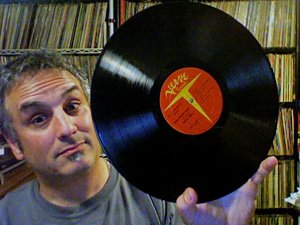It’s the time of year for saving money!
Sometime in the mid 1980s, the notion of the “tribute album” emerged, with a producer assembling an artist-themed collection of songs as interpreted by as diverse a populace of then-current and sometimes-influential musicians as possible. Thus over the years we have been graced with a barrage of collections paying homage to everyone from Americana-Folk pioneer Woody Guthrie to British rock icons XTC. Some of these tribute sets faired better than others.
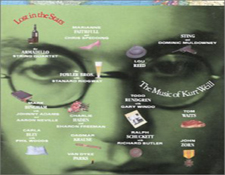 Certainly at the top of the list of producers of these sorts of homage works — and arguably, a pioneer of the genre — has to be producer Hal Wilner. One of his fine early productions was a collection called Lost In The Stars: The Music Of Kurt Weill bringing together artists as diverse as Tom Waits, Sting, Marianne Faithful, Richard Butler, Todd Rundgren, John Zorn, Lou Reed and Van Dyke Parks.
Certainly at the top of the list of producers of these sorts of homage works — and arguably, a pioneer of the genre — has to be producer Hal Wilner. One of his fine early productions was a collection called Lost In The Stars: The Music Of Kurt Weill bringing together artists as diverse as Tom Waits, Sting, Marianne Faithful, Richard Butler, Todd Rundgren, John Zorn, Lou Reed and Van Dyke Parks.
Given its release squarely in the middle of the ’80s — 1985 to be exact — this album’s release coincided the point where the emerging Compact Disc (CD) format was starting to gain some real traction among consumers. One of the techniques the record labels of the time employed to nurture this growth was to include (and feature) extra tracks that were not on the LP version, taking advantage of the additional storage space on the CD while enticing consumers to jump on the new format bandwagon because of the addition music. Lost In The Stars: The Music Of Kurt Weill was one such album and I (for one) can attest to having purchased it on CD over the LP for this very reason.
Generally it was a very good CD for the times, with a not-offensively bright overall sound that appeared to be fresh and squeaky clean. Given that so many different artists were involved, the music inevitably came from a variety of studios and sources around the world. Its important to remember that these were the days before Pro Tools and computer based home digital audio workstations were the norm for making music — in general musicians still had to go into some sort of professional studio to make a recording.
At that point in time, the LP was still a viable format for many and a certain amount of these vinyl discs sold side by side the CD.
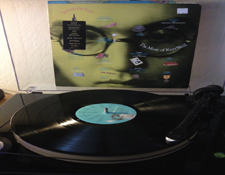 Recently I had the good (and odd) fortune to find two affordably priced LP pressings of the album which I picked up out of curiosity given I’d never actually heard the album on that format. One of the pressings is either a very early edition or possibly an unmarked promotional copy that is pressed on (what I am assuming is) Quiex Vinyl (which appears opaque when you hold the disc up to the light). A&M Records, the label issuing this album, was indeed putting out many of its albums on this vinyl formulation during this period.
Recently I had the good (and odd) fortune to find two affordably priced LP pressings of the album which I picked up out of curiosity given I’d never actually heard the album on that format. One of the pressings is either a very early edition or possibly an unmarked promotional copy that is pressed on (what I am assuming is) Quiex Vinyl (which appears opaque when you hold the disc up to the light). A&M Records, the label issuing this album, was indeed putting out many of its albums on this vinyl formulation during this period.
For my first comparison / contrast, I’m going to dive to track number eight by The Armadillo String Quartet doing Weill’s “Youlaki Tango.” While the CD is indeed crisp and clean as a freshly washed formica table top, it also sounds comparatively heartless — like so much fluorescent light in that cheap roadside cafe — in contrast to the LP version. In fact, there were points where the angularity of the strings actually hurt my ears at certain peaks, even listening at low volume. On the black vinyl LP the sound is richer and warmer, with more natural sounding strings that reveal more of the wood-tones of the individual instruments. The difference is pretty striking even with the LP cramming about 30 minutes of music per side (it really should have been a two LP set).
Switching over to the Quiex pressing, I was surprised to find it sounded somewhat clearer overall, yet retained the warmth I heard on the standard black vinyl. Its not a dramatic difference, but its there. The Quiex vinyl seemed to disappear more readily from my listening perspective, delivering a quieter noise floor that enabled me to just focus on the music first and foremost Admittedly, the black vinyl pressing had seen a bit more love over the years than this Quiex pressing and was no doubt a bit noisier because of it, but — reading between the lines, if you will — in general I found the Quiex pressing nicer overall.
Not surprisingly, the instruments and voices sounds much more natural on the LP than the CD even on quirky tracks such as “Der kleine Leutnant” by John Zorn where march-step drums collide with acoustic guitars, accordions and chirping vocals.
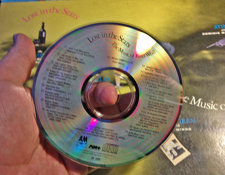 Some of my favorite tracks on here include Richard Butler’s (Psychedelic Furs) rollicking version of “Alabama Song” and Marianne Faithful’s “Ballad of the Soldier’s Wife.” At the time this came out, the notion of hearing Sting do “Mack the Knife” was wildly out of character for him but in retrospect, this recording may be one of the best things he’s ever recorded — his performance holds up really well after all these years. And how wonderful to hear Van Dyke Parks’ “Johnny Johnson Medley” which — if you’ve ever listened to any of Mr. Parks’ own compositions and albums — underscores the influence Weill has had on him. This recording could easily have appeared on his 80s album Jump or on his more recent Songs Cycled collection.
Some of my favorite tracks on here include Richard Butler’s (Psychedelic Furs) rollicking version of “Alabama Song” and Marianne Faithful’s “Ballad of the Soldier’s Wife.” At the time this came out, the notion of hearing Sting do “Mack the Knife” was wildly out of character for him but in retrospect, this recording may be one of the best things he’s ever recorded — his performance holds up really well after all these years. And how wonderful to hear Van Dyke Parks’ “Johnny Johnson Medley” which — if you’ve ever listened to any of Mr. Parks’ own compositions and albums — underscores the influence Weill has had on him. This recording could easily have appeared on his 80s album Jump or on his more recent Songs Cycled collection.
I completely forgot about how much I liked Lou Reed’s take on “September Song” and this LP version sounds fabulous with a surprisingly big sounding strum-y acoustic guitar held up by Fernando Saunders’ round-as-a-red-rubber-ball Fretless Bass lines; Lou’s electric guitar solo is scorching and when the Stax-like horn section comes in, well, its just so much icing on the cake. .
So, what about those CD bonus tracks that I went out of my way to get back in the day? Well, they are still there on the CD and available for my listening pleasure when and where I want it. The CD format — or a digital “rip” for my iPhone — is still a better portable listening medium than the LP and this album is actually a fun recording to listen to in the car.
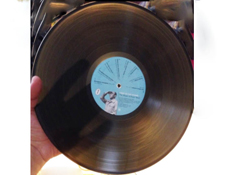 You can find copies of Lost In The Stars: The Music Of Kurt Weill on Amazon going for prices ranging from lower $20s to nearly $100! If that is too much, spend some time and look around in your favorite used shops as I’m sure you can find copies of this around in your local stores — I know I was surprised to see this selling for more than $20 in some stores on the East Coast recently — which may have, in fact, prompted my interest in looking for a vinyl copy. When I got back to good old California I quickly found an inexpensive copy at Green Apple Books & Records selling for $4 (the Quiex copy!) and the lesser black vinyl copy in the bargain bin at Amoeba Records for $1.
You can find copies of Lost In The Stars: The Music Of Kurt Weill on Amazon going for prices ranging from lower $20s to nearly $100! If that is too much, spend some time and look around in your favorite used shops as I’m sure you can find copies of this around in your local stores — I know I was surprised to see this selling for more than $20 in some stores on the East Coast recently — which may have, in fact, prompted my interest in looking for a vinyl copy. When I got back to good old California I quickly found an inexpensive copy at Green Apple Books & Records selling for $4 (the Quiex copy!) and the lesser black vinyl copy in the bargain bin at Amoeba Records for $1.
There are many bargains to be found out there in the land of record collectors. You just need to get out and look, folks.
Happy hunting!
